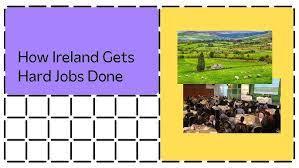
Like many countries, Ireland is no stranger to polarisation and conflict. This island of 5 million has, however, come up with a unique way of “getting hard jobs done,” in the words of Chief Executive of the Electoral Commission Art O’Leary: the frequent use of Citizens’ Assemblies to enable collective problem-solving on everything from abortion laws to protecting biodiversity.
In the video above, O’Leary tells the story of Ireland’s Assembly on abortion and women’s health. As he explains, the several dozen Assembly Members in one room were way ahead of the politicians, and they proved to be representative in miniature of the wider public: their conclusions were ultimately approved in a population-wide referendum.
Ireland’s latest Assembly, focused on drug use, concluded last month on October 23. The 99 citizens, selected by lottery, recommended that Ireland prioritise public health and decriminalisation when it comes to personal drug use, instead of taking a punitive criminal justice approach.
The Irish Times editorialised, “It should be clear to all that the current approach has failed. The Assembly has made a serious and worthwhile contribution to an important and necessary debate.” Their recommendations will now be considered by the Irish Parliament.
Genuine democracy doesn’t often unfold in straight, predictable, or partisan lines. While the Irish Assembly Members reached near-consensus around what many would label a more “progressive” approach to drugs and addiction, they were divided on the question of legalising cannabis, and did not ultimately support it.
Besides the Assembly’s policy work, the process of citizen deliberation also strengthens democratic muscles on an individual and group level.
One can hear the sense of greater agency, civic responsibility, and connection in both of the videos above, which quote from Irish citizens who deliberated on biodiversity loss. Or in the comments of this Assembly Member to The Journal about the latest Assembly on drug use: “I’d never heard of a Citizens’ Assembly, but after each of our sessions I had more of an opinion. I’d find myself thinking about it on the drive home.”
Often, Assembly Members strike up new friendships or begin to consider their fellow citizens with greater openness. In France, randomly-selected Assembly members who’d never met before partied together late into the night. In Ireland, as our CEO Claudia Chwalisz and the Rockefeller Foundation’s Zia Khan recount in their recent op-ed for Fast Company, two very different men formed a lasting bond after they met at the Irish Assembly on abortion:
In the winter of 2013, two men found themselves on a surprising journey. Finbarr O’Brien, a traditionalist Catholic in his late fifties from rural Ireland, and Chris Lyons, a gay man in his early thirties from Dublin, were both randomly chosen from the Irish electoral register. They were about to join 64 of their fellow Irish citizens in a groundbreaking democratic experiment: a citizens’ assembly—jointly proposed by the center-left Labour and center-right Fine Gael parties as a way to move forward from perennial, divisive debates about amending the Irish Constitution, starting with provisions on same-sex marriage and abortion.
Little did Finnbar and Chris know that not only would this process impact the fate of same-sex marriage in Ireland, but it would also forge an unlikely yet profound friendship between the two men. This was the meeting of opposites—a rare encounter that can only emerge in a neutral space where preconceived notions are set aside in favor of respectful dialogue. At a time when polarization and partisanship create political stalemates for democratic governments worldwide, new tools are required to strengthen the social contract. This may be one of them.









